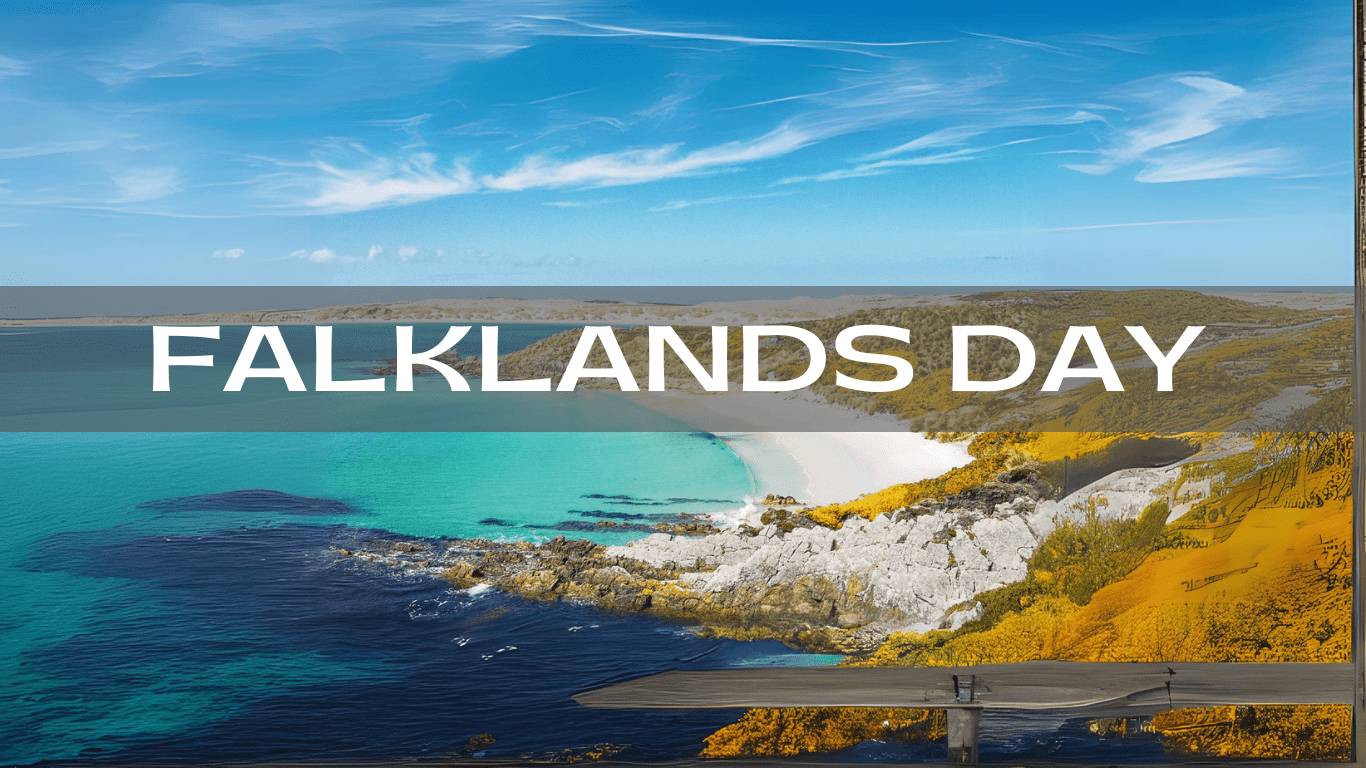
- This event has passed.
Falklands Day
August 14

Falklands Day, celebrated on 14th August each year, is a significant event in the Falkland Islands, a British Overseas Territory located in the South Atlantic Ocean. This day commemorates the first recorded sighting of the Falkland Islands by European explorers and serves as a celebration of the islands’ history, culture, and identity. While the day is not a public holiday, it holds considerable cultural importance for the islanders and is marked by various local events and activities that reflect the unique heritage of the Falkland Islands.
Historical Background:
Falklands Day is rooted in the history of exploration and discovery. The date, 14th August, marks the anniversary of the first recorded sighting of the Falkland Islands by a European, which took place in 1592. The sighting is credited to the English explorer John Davis, who was navigating the waters of the South Atlantic aboard the ship Desire. While Davis did not land on the islands, his account is the earliest known European reference to the Falklands, marking the beginning of the islands’ recorded history.
The Falkland Islands have a complex history of exploration, settlement, and territorial claims. Over the centuries, the islands were visited and claimed by various European powers, including the British, French, Spanish, and later the Argentinians. The British established a formal settlement on the islands in 1765, and despite various disputes, the Falklands have remained under British control since 1833.
Falklands Day was established to recognise the historical significance of the islands and to celebrate the resilience and identity of the Falkland Islanders. The day is a reflection of the islanders’ connection to their homeland and their pride in its history and culture.
Significance:
Falklands Day is significant as it highlights the unique identity of the Falkland Islands and their people. The day serves as a reminder of the islands’ rich history, from their discovery by European explorers to their status as a British Overseas Territory. For the Falkland Islanders, Falklands Day is an opportunity to express their pride in their heritage and to celebrate the distinct culture that has developed in the islands over the centuries.
The day is also a reflection of the islanders’ resilience and determination to maintain their way of life in a remote and often challenging environment. The Falkland Islands have a small population, and the community is closely knit, with a strong sense of identity and independence. Falklands Day reinforces these values and provides an occasion for the islanders to come together and celebrate their shared history and culture.
How Falklands Day is Celebrated:
1. Community Gatherings: Falklands Day is marked by community events and gatherings, where islanders come together to celebrate their shared heritage. These events often include speeches, presentations, and exhibitions that highlight the history of the islands and the contributions of past and present generations.
2. Cultural Activities: The day is also an occasion for cultural activities that showcase the unique traditions and customs of the Falkland Islands. This might include traditional music and dance, storytelling, and displays of local crafts and artwork. These activities serve to preserve and promote the cultural heritage of the islands.
3. Educational Programs: Schools and educational institutions in the Falkland Islands often use Falklands Day as an opportunity to teach students about the history and significance of their homeland. This may involve special lessons, presentations, and projects focused on the exploration, settlement, and development of the islands.
4. Historical Re-enactments: In some years, historical re-enactments or commemorative events may be organised to bring the history of the islands to life. These events help to connect the islanders with their past and to honour the explorers, settlers, and others who have shaped the history of the Falklands.
5. Reflection and Remembrance: Falklands Day is also a time for reflection and remembrance, particularly in relation to the Falklands War of 1982, a conflict between the United Kingdom and Argentina over the sovereignty of the islands. While the war is commemorated separately on Liberation Day (14th June), Falklands Day provides another occasion for islanders to reflect on their recent history and the sacrifices made to defend their home.
Global Comparisons:
While Falklands Day is unique to the Falkland Islands, it shares similarities with other national and cultural observances around the world that celebrate a region’s history and identity. For example, Australia Day, Canada Day, and Bastille Day in France all serve as national celebrations of history, culture, and national identity. Like Falklands Day, these observances often involve community gatherings, cultural activities, and reflections on the past.
Conclusion:
Falklands Day is a day of pride, reflection, and celebration for the people of the Falkland Islands. It honours the islands’ history, from the first European sighting by John Davis in 1592 to the present day, and celebrates the unique culture and identity that has developed in this remote British Overseas Territory.
For the islanders, Falklands Day is an opportunity to come together as a community, to celebrate their heritage, and to express their pride in their homeland. It is a day that reinforces the strong sense of identity and independence that characterises the Falkland Islands, and it serves as a reminder of the resilience and determination of the islanders in preserving their way of life.
Falklands Day may be a lesser-known observance on the global stage, but for the people of the Falkland Islands, it is a day of deep significance and a cherished tradition that continues to strengthen their connection to their land and their history.